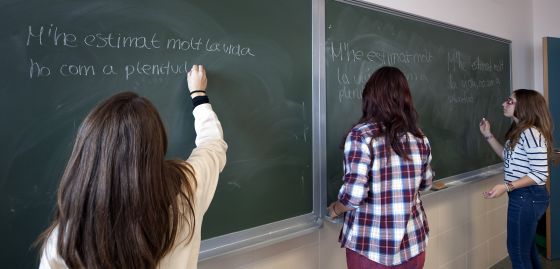Low scores do not reflect 15-year-olds’ theoretical skills in math, reading and science

Students in class in the Valencia
region.
They have trouble programming an air conditioner, selecting the best route to
get to a new location on public transport, and predicting the behavior of a
robotic household cleaner inside a room.
Spanish 15-year-old students come out 23 points below average among developed
economies in ordinary problem-solving skills, according to the latest Program
for International Student Assessment (PISA) report, a triennial study conducted
by the Organisation for Economic Co-operation and Development (OECD).
The performance by the 2,709 Spanish students who participated in the program
– which evaluated 85,000 youngsters from 44 countries – shows that they are less
well prepared to tackle the problems of everyday life than their scores in math,
reading and science would suggest.
Their problem-solving skills were 20 points below those expected based on
their theoretical knowledge. In other words, they are unable to use what they
learned.
“The world economy does not focus on what one knows, but on what one can do
with what one knows,” noted the OECD’s education chief, Andreas Schleicher, who
traveled to Spain to present the test results.
“What’s needed is a radical change in the teaching methodology,” added
Montserrat Gomendio, state secretary for education, during the presentation of
the report. Gomendio said current methods were “old-fashioned” and based only on
memorizing content. Responsibility for this change, she said, falls mostly on
the shoulders of teachers.
The PISA report shows that 28 percent of Spanish 15-year-olds failed to reach
a minimum baseline level of proficiency in problem solving, compared with a
21-percent OECD average. Spain obtained a mean score of 477 points (500 is the
OECD average), ranking between 27th and 31st out of 44. The list leaders are
Singapore and South Korea with 562 and 561 points, respectively.
Spain is dragged back by several factors. First there is the fact that the
difference between problem solving by kids from low and high socioeconomic
backgrounds is not nearly as marked as in other countries: 42.7 points compared
with an average of 68.8. In other words, the children of highly educated parents
perform worse than expected, bringing the average down. State secretary Gomendio
said the “rigidity” of the education system establishes “an equity which is
taken to mean that everyone must be uniformly mediocre.”
The high rate of students who repeat a grade (33.2 percent compared with the
OECD average of 17 percent) also brings the scores down. Without them, Spanish
students would obtain a score of 512 points, in line with the OECD average.
The PISA report notes that Spanish students seem unfamiliar with computer
use, based on their digital reading scores. Yet 96.6 percent of Spanish
teenagers have a computer at home, and 75.3 percent use computers or tablets in
their houses, five points above the OECD average.
 19:42
19:42
 evalample
evalample
 Posted in
Posted in


0 comentarios :
Publicar un comentario